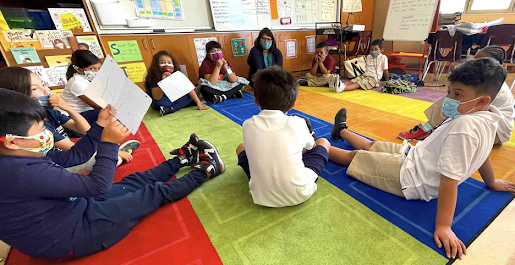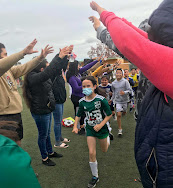 |
| Source: Oakland Leaf |
By Guest Blogger, Melissa Mendez Ochoa, Executive Director, Oakland Leaf (This blog was originally posted on Oakland Leaf's Blog.)
When talking about Oakland Leaf’s approach to youth development, we often use the term restorative justice (RJ). While RJ, as a concept, has become relatively mainstream, most people only have a fuzzy idea of what it is in practice. In western culture, people tend to think of RJ as a contemporary way of resolving conflict – an alternative to the current punitive justice system.
At Oakland Leaf, we see RJ as much more than a set of conflict resolution or behavior management tools. We draw from RJ’s roots in indigenous peacemaking practices that provide a holistic framework for not only repairing harm, but also nurturing and sustaining individual relationships and community bonds. Oakland Leaf has RJ Coordinators at all six of our afterschool program sites, and the grounded, loving support they provide our students on a daily basis is some of the most inspiring work I’ve ever observed.
In conversation with some of our RJ coordinators last week, I was reminded of what a critical resource they have been to our students these past several months. By sharing a few of the interventions they described to me, I hope to shine a spotlight on – and paint a clearer picture of – Oakland Leaf’s restorative justice work:
An afterschool program class of 20 students was experiencing ongoing challenges related to bullying behavior and conflict between students. The RJ Coordinator organized a circle about anger and healthy ways of managing and expressing it. Students passed around a talking piece and shared why they were personally having a hard time and why they thought the group was struggling. Consistently, this go-round revealed underlying issues such as hurt feelings or conflict from earlier in the school day, fatigue, or students missing their parents, among other challenges.
 |
| Source: High Speed Training |
After this, students shared how they tend to express and respond to different emotions and what the outcomes tend to be for various kinds of expression. Next, the RJ Coordinator said “Now we know what is happening. What do we need for ourselves – from another person, from the instructor, or in general – to be able to move forward in a positive way?” Students shared things like “When I get mad, I need a break and some alone time”, “I need my friends to say something nice to me”, and “I need some one-on-one time with a grownup”.
The last part of the circle involved everyone making a commitment to what they would do to help the group move forward in a more healthy way. Students made commitments such as “I will ask for space when I need it”, “I will try to be more understanding when someone says or does something I don’t like”, and “I will share my appreciation when others are stepping up in positive ways”. The RJ Coordinator has since regularly checked in with this group and each student, reminding them of their commitments and creating spaces for them to share progress and challenges.
 |
| Source: High Speed Training |
A 5th grade teacher reached out to one of our RJ Coordinator’s about a student that she suspected was being bullied during the school day. Our RJ Coordinator was able to build a strong relationship of trust with this student through daily check-ins. The student confided in her that he was having a hard time interacting with his peers and making friends, and that he felt isolated and alone. The student’s dread about school began to wane once he had a caring adult he felt comfortable turning to on a daily basis for support and a sense of safety. Through ongoing coaching from the RJ Coordinator, he began to improve his social and communication skills and started making friends.
 |
| Source: Oakland Leaf |
One of our afterschool program soccer teams lost their first two games and students began lashing out, blaming each other for the loss. The negative interactions and hostility began to impact the overall morale of the class. The RJ Coordinator designed and facilitated an RJ circle specifically about teamwork and community. Students talked about what teamwork looks like, sounds like, and feels like. They discussed how they can simultaneously be supportive and hold each other accountable, on and off the field. Students also talked about what can be learned from “losing” in competitive sports and how to deal with hard feelings in healthy ways. They left the circle with renewed bonds and new tools to identify and cope with feelings of disappointment and frustration.
I hope these examples of Oakland Leaf’s every day application of restorative justice principles and practices provide you with a bit more insight into the power and potential of this work.
MORE ABOUT...
Melissa Mendez Ochoa is the Executive Director of Oakland Leaf. Melissa grew up in Napa Valley and made the move to the East Bay when she decided to attend the University of California, Berkeley. Melissa earned her Masters in Business Administration from the Haas School of Business at UC Berkeley. In the of Spring of 2019, Melissa became Oakland Leaf’s Executive Director. In her free time, Melissa is in active alumna of TRENZA UC Berkeley and an avid sports fan of the Golden State Warriors, San Francisco Giants, and San Francisco Niners.Oakland Leaf serves more than 800 students annually through daily afterschool programming at seven high-need East Oakland elementary and middle schools, paid internship programs for high school students, and a summer camp. With an emphasis on social-emotional learning, academic support/literacy, creative expression, movement and sports, connection with nature, STEM, and social justice, we are supporting Oakland youth and families to be lifelong leaders creating positive change in their own lives, their communities, and in the world.
[Upcoming Webinars]
Promoting Financial Literacy for Youth in Afterschool Programs
This webinar will feature afterschool practitioners who have successfully integrated financial literacy in their programs. It will also feature financial literacy experts on why financial literacy is important for youth, available curriculum and materials, and how to get started offering financial literacy in your afterschool program.
To learn more and register, click here.
Restorative Justice Practices in Afterschool Programs
This webinar will feature afterschool practitioners who have successfully integrated restorative justice practices into their programs. It will also feature restorative justice experts on why it is important for youth, available curriculum and materials, and how to get started using restorative justice practices in your afterschool program.
To learn more and register, click here.










